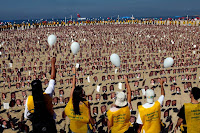" ... Cults represent one aspect of a worldwide epidemic of ideological totalism, or fundamentalism. They tend to be associated with a charismatic leader, thought reform, and exploitation of members. Among the methods of thought reform commonly used by cults are milieu control, mystical manipulation, the demand for purity, a cult of confession, sacred science, loading the language, doctrine over person, and dispensing of existence. The current historical context of dislocation from organizing symbolic structures, decaying belief systems concerning religion, authority, marriage, family, and death, and a "protean style" of continuous psychological experimentation with the self is conducive to the growth of cults. The use of coercion, as in certain forms of "deprogramming," to deal with the restrictions of individual liberty associated with cults is inconsistent with the civil rights tradition. Yet legal intervention may be indicated when specific laws are broken.
Two main concerns should inform our moral and psychological perspective on cults: the dangers of ideological totalism, or what I would also call fundamentalism; and the need to protect civil liberties."
Independent Ireland: Gaslighting: What is it, how to recognise it and how to protect yourself from it
"Gaslighting is a form of psychological manipulation in which the perpetrator makes the victim doubt their own memories, perceptions and behaviours. We talk to the experts about the warning signs and how to stand up to a gaslighter.
Calm down. You're so emotional. I never said that. That never happened. It's not a big deal. Stop imagining things. You're always twisting things. I would never have done that. Stop being so dramatic. You're over sensitive. I was just kidding. You're remembering it wrong. What's the matter with you? You're insane. You need help.
This is gaslighting. Mostly it happens in intimate relationships, but really it can happen anywhere — at work, in friendships, in politics. It's not a medical term, but a colloquialism referring to a form of psychological manipulation where over time the manipulated person begins to doubt their own memory, perception, even their reality.
It is a gradual process, which makes it difficult to detect if you're on the receiving end, and even more difficult to extricate yourself from, as it slowly but steadily erodes your sense of self, and of what's real. At its most malevolent, it's crazy making. Like narcissistic rage and coercive control, it is abuse without the black eyes; this is not to say, however, that the violence can progress from psychological to physical."
Iran News Wire: Iran: Bahai Woman Sentenced To 5 Years In Prison
" ... Unofficial sources say that there are more than 300,000 people following the Bahai Faith in Iran. However, the Constitution of the Islamic Republic of Iran only recognizes Islam, Christianity, Judaism, and Zoroastrianism and does not recognize Bahaism.
Since the 1979 Islamic Revolution in Iran, Iranian Bahais have been systematically persecuted as a matter of government policy. During the first decade of this persecution, more than 200 of Iran's Bahais were killed or executed. Hundreds more were tortured or imprisoned, and tens of thousands lost jobs, access to education, and other rights – all solely because of their religious belief.
The persecution of Iran's Bahais is still ongoing with dozens of Bahais languishing in prisons throughout Iran."
"Utopia's finest hour, Akash Kapur writes in "Better to Have Gone," is the very beginning, "when the dream remains unsullied." The phrase has the ring of preordainment: From the heights of a vision, there is nowhere to go but down.As it does — viciously then tragically — in his memoir, which is also a group biography, the investigation of a mystery, a meditation on searching and faith, and an act of love. Kapur's main subject is Auroville, a 53-year-old intentional community in southern India where both he and his wife, Auralice, were raised, and where, in 1986, her mother and adoptive father died. The murky circumstances of their deaths shadow Kapur's marriage, all the more when he and Auralice move back to Auroville in 2004. There her parents' fates have been transmuted into a mix of legend, theory and gossip, even as their bodies lie in unmarked graves. Kapur decides (with his wife's help, though she is not credited as an author) to excavate the past. Knowledge, he hopes, might bring peace.This is a haunting, heartbreaking story, deeply researched and lucidly told, with an almost painful emotional honesty — the use of present tense weaving a kind of trance. I kept wanting to read "Better to Have Gone" because I found it so gripping; I kept wanting not to read it because I found it so upsetting. The image that came to mind, again and again, was of human lives being dashed against the rocks of rigid belief.
News, Education, Intervention, Recovery
Intervention101.com to help families and friends understand and effectively respond to the complexity of a loved one's cult involvement.
CultRecovery101.com assists group members and their families make the sometimes difficult transition from coercion to renewed individual choice.
CultNEWS101.com news, links, resources.
Cults101.org resources about cults, cultic groups, abusive relationships, movements, religions, political organizations and related topics.
Selection of articles for CultNEWS101 does not mean that Patrick Ryan or Joseph Kelly agree with the content. We provide information from many points of view in order to promote dialogue.
Please forward articles that you think we should add to cultintervention@gmail.com.




